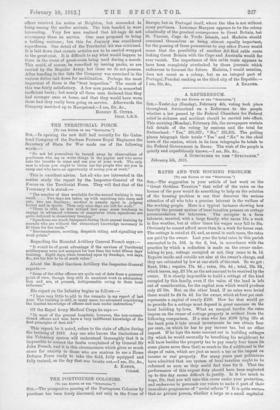THE TERRITORIAL FORCE.
[To Till EDITOR OP TIIX "SPECTATOR.1
Stn,—In opening the new drill hall recently for the Gates- head Company of the Durham Fortress Royal Engineers the Secretary of State for War made use of the following words :—
"Do not let yourselves be turned away by observations of gentlemen who say or write things in the papers and who never take the trouble to come and see you at your work. The only men to whom you ought to listen are the people who see you in camp and who have an opportunity of seeing you at work."
This is excellent advice. Let all who are interested in the matter study the report by the Inspector-General of the Forces on the Territorial Force. They will find that of the Yeomanry it is stated :— "The number of days available for the annual training is very small. • . . Two days are taken up with marching into camp and out two are Sundays ; another is usually spent in judging horses and in sports. Thus only nine days are left for work."
"There is still, as was noticed last year, some tendency to engage in advanced schemes of ina,no3uvre whea squadrons are quite deficient in elementary training." "Squadrons are much hampered during their annual training by recruits who are without the elementary knowledge necessary to fit them for the ranks."
"Reconnaissance, scouting, despatch riding, and signalling are weak points."
Regarding the Mounted Artillery General French says :—
"It would be of great advantage if the services of Territorial artillerymen were not accepted for lege than the total fifteen days' training. Eight days, when trenched upon by Sundays, wet days, are too few to be of much value."
About the Royal Garrison Artillery the Inspector-General reports :—
"Some of the older officers are quite out of date from a gunnery point of view, though they still do excellent work in administra- tion and are, at present, indispensable owing to their local influence."
His report on the Infantry begins as follows :—
"I have very little to add to the remarks in my report of last year. The training is still, in many cases, too advanced considering the limited knowledge of officers and men under instruction."
Of the Royal Army Medical Corps he says :— "In most of the general hospitals, however, the non-commis- sioned officers and men have a very indifferent knowledge of the first principles of first aid."
This report, be it noted, refers to the state of affairs during the training of 1910. Any one who knows the limitations of the Voluntary system will understand thoroughly that it is impossible to correct the faults complained of by General Sir John French, and it is this circumstance which gives so much cause for anxiety to those who are anxious to see a Home Defence Force ready to take the field, fully equipped and fully trained, on the day that war breaks out.—I am, Sir, &a.,
A. KEEN;
Colonel.










































 Previous page
Previous page